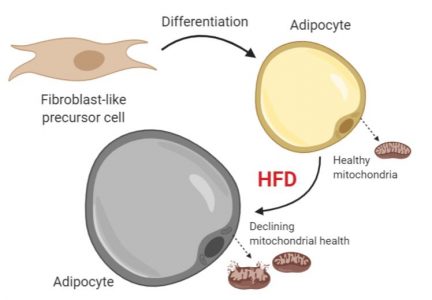A new study out of the Farmer lab in collaboration with the Perissi lab, published in Scientific Reports, describes the effect of prolonged high fat diet on visceral adipocytes.
As adipose tissue expands, it undergoes remodelling to accommodate expanding adipocytes and other needs of the tissue to keep it healthy. However, under certain dietary conditions, this remodelling can transition to an unhealthy state marked with increased deposition of extracellular matrix and fibrosis. In its simplest form, adipose tissue can be broken down into 2 compartments – adipocytes and stromal vascular cells. The effects of a high fat diet on the stromal vascular cells has been closely studied, but far less attention has been given to the adipocyte, especially with a prolonged high fat diet.
Researchers took a deep dive into assessing the effect of high fat on the adipocyte over 34 weeks. They demonstrated that under the insult of a high fat diet, visceral adipocytes turned on transcriptional programs driving remodelling while also suppressing programs essential to an adipocyte, notably those associated to mitochondria. In fact, the research demonstrated that the transcriptional profile of the high fat diet adipocytes was strikingly similar to fibroblasts, with increased expression of extracellular matrix, cytoskeletal and cell adhesion genes. Overall, this work highlighted the response of adipocytes to a high fat diet environment with the goal of furthering our understanding of this process to aid in the discovery of new targets for the treatment of obesity.